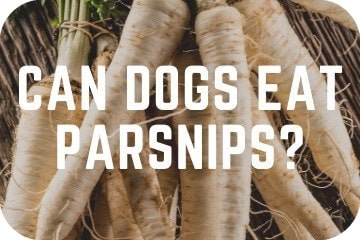
Can dogs eat parsnips? Yes, parsnips are safe for dogs to eat. They are a good source of fiber, contain antioxidants, and are low in calories. Parsnips can help with digestion, weight loss, bone health, and may help prevent cancer.
As with all food, make sure it is incorporated into your pet’s daily allowance to avoid obesity. If you are using parsnips as a treat, treats should only make up 10% of your dog’s recommended daily allowance.
Make sure to introduce new foods slowly. Rapidly changing your pet’s diet can result in an upset stomach.
Busy? Get Your Hands Paws On The Answers Quickly…
- What Are Parsnips?
- Health Benefits Of Parsnips For Dogs
- Risks Of Parsnips For Dogs
- Other Root Vegetables Suitable For Dogs
- Parsnip Dog Treat and Food Recipes
- FAQs
WHAT ARE PARSNIPS?
Parsnips are a root vegetable related to parsley and carrots. They can be eaten raw, boiled, fried, steamed, baked, and pureed. They are a common ingredient in soups and traditional on a Christmas dinner.
Taste – Parsnips are sweet when cooked. When they are raw, they taste a cross between a carrot and potato.
Texture – Raw parsnips are crunchy like a potato or carrot. Once they are cooked, they soften. They can be pureed and mashed.
Sight – Parsnips are a creamy white color. They are usually 5 to 10 inches in length. They have a larger top and taper downwards.
HEALTH BENEFITS OF PARSNIPS FOR DOGS
Amount Per 100g
| Energy | 75 kcal |
| Total Fat | 0.3g |
| Total Carbohydrates | 0.3g |
| Dietary Fiber | 4.9g |
| Sugar | 4.8g |
| Protein | 1.2g |
May Help Against Cancer
Parsnips contain antioxidants. Antioxidants help to neutralize free radicals. Free radicals are reactive chemicals that can harm healthy cells. By neutralizing the free radicals, it prevents them from causing damage. This may help prevent conditions such as cancer (link).
Bone Health
Parsnips are rich in calcium, which is known to strengthen bones and support dental health.
Digestive Health
Parsnips have high levels of fiber, which is excellent for digestive health. They will keep your pups regular, keep the digestive system moving, and prevent constipation.
Reduce Obesity
With high levels of fiber and low calories, parsnips will keep your pooch fuller for longer. This can help with losing weight.
Improve Immune System
Parsnips are a great source of vitamin C. Vitamin C acts as an antioxidant to help reduce free radicals. This can help boost the immune system and help with inflammation.
Although dogs naturally produce vitamin C when they are tired or stressed physically or mentally, their vitamin C levels can reduce. Thus, it is essential to add to their diets.
RISKS OF PARSNIPS FOR DOGS
Additives
Do not feed your dog parsnips from your plate. The chances are they will have been cooked in oil, have salt, pepper, and other seasonings on. All of which can be dangerous for dogs. To give your dog parsnip, either cut chunks up raw or cook with dog-safe ingredients. Check out our recipes below for ideas.
Stomach Upset
Altering your dog’s meals too quickly or too drastically can cause vomiting and diarrhea. With any new food, introduce it slowly. We recommend adding 1-2 tbsp to your dog’s meal and increasing and exchanging from there.
Potential Risk For Diabetic Pets
Parsnips have a high glycemic index. This is a number assigned to foods that contain carbohydrates. It indicates how quickly the food affects sugar levels. The scale runs from 0-100, anything over 70 is considered to have a high glycemic index.
This means that parsnips could cause a spike in sugar levels; this can be a serious issue if your dog is suffering from diabetes.
However, parsnips have a relatively low number of carbs. This means that despite have a high GI, the response would not be as severe as other high sugar foods.
If your dog does have diabetes or any conditions which could be affected by carbohydrate levels, contact a veterinarian or nutritionist before feeding to your dog.
Potential Risk For Pets With Kidney Issues
Parsnips contain a good amount of potassium. Potassium is essential to a dog’s diet. It helps with brain function and muscle activity. However, if your dog has renal issues, then discuss with your veterinarian whether parsnips are suitable for their diet.
OTHER ROOT VEGETABLES SUITABLE FOR DOGS

Sweet Potatoes – Sweet potato is a classic dog food ingredient. Most dogs love the sweet taste. It is packed full of fiber, vitamins, and minerals, which are essential for your dog.
Carrot – Carrots are an excellent low carb snack, perfect for helping with obesity in your dog. They also contain antioxidants and lots of other nutrients. They are perfect for cutting up small as training treats, they also work well frozen and used for teething puppies.
Turnips – Turnips are great for dogs. They contain vitamin C, which can help with immunity. They can be mashed or cut up small and added to your dog’s food.
Beets – Beetroot can improve digestive health and immunity in dogs. It also contains iron, which can help prevent conditions like anemia. Check out our post Can Dogs Eat Beets for more information.
PARSNIP DOG TREAT AND FOOD RECIPES
Traditional Christmas Dinner
Ingredients:
The volume of ingredients will need to be adjusted to suit your dog’s size, weight, and activity level.
– 4 parts leftover turkey, boneless, skinless
– 1 part parsnip
– 1 part carrot
– 1/4 part peas and green beans
– 1/8 part cranberry sauce, unsweetened, no nuts or fruits
Directions:
1. Boil the carrot and parsnip together until soft.
2. Mash and set aside to cool.
3. In the dog’s bowl, add all of the ingredients together.
4. Once cool, serve to your dog.
Dehydrated Parsnip Chips
Ingredients:
– Parsnips
Directions:
1. Set a large pot of water over medium-high heat.
2. Create an ice bath by filling a bowl with ice and cold water.
3. Cut off both ends of the parsnip and scrub under water until clean.
4. Slice the clean parsnips into 1/4-inch thick circles.
5. Once the waters boiling, add the parsnip pieces and blanch for 3-4 minutes.
6. Remove from the boiling water and place in the ice bath.
7. Preheat oven to the lowest setting.
8. Once the parsnips are cold, remove from the ice bath and pat dry with a kitchen towel.
9. Place on a tray and cook for 3-4 hours, after the 4 hours check every 10-15 minutes until they reach a suitable chewiness.
10. Allow to cool before feeding to your dog.
Parsnip Treats
Ingredients:
– 1 cup grated parsnip
– 3 cups whole wheat flour
– 1 egg
– 3/4 cup water
Directions:
1. Preheat the oven to 350 degrees F (175 degrees C).
2. Line a baking sheet with parchment paper.
3. Combine all of the ingredients in a bowl and mix until combined.
4. Use your hands to knead the dough into a ball.
5. Remove the dough from the bowl and roll to 1/3-inch thick.
6. Cut to desired shape and size.
7. Place on the baking sheet and bake for 25 minutes, or until the tops brown.
8. Allow to cool before feeding to your dog.
FAQS
What vegetables can dogs eat?
Dogs can eat a whole variety of vegetables, including carrots, broccoli, green beans, peas, Brussels sprouts, among others.
Can dogs eat cauliflower?
Yes, cauliflower is not toxic to dogs. Feed it in small amounts with no seasonings. It is thought to cause gas, so we recommend alternative vegetables.
Can dogs eat turnips?
Yes, as discussed earlier, turnips are a healthy option for dogs.
Can dogs eat potatoes?
It depends, they’re not toxic, but they’re not particularly nutritious either. Many other vegetables are far more beneficial to dogs, including sweet potatoes. If you are going to feed your dog potatoes, make sure they are unseasoned and cooked only in water. Raw potatoes contain solanine, which can be toxic to dogs.
Can dogs eat cabbage?
Yes, cabbage is rich in antioxidants and can be beneficial to a dog’s health. However, like cauliflower, it can cause gas.
Can dogs eat broccoli?
Yes, it can be a healthy snack for dogs once cooked. It is best to boil or steam the broccoli before feeding it to your dog. If you are looking to find out more, check out our article Can Dogs Eat Broccoli here (link).
Can dogs eat peas?
Yes, as long as they are not canned. Canned food tends to contain sodium, which can be harmful to dogs. Other varieties, including raw and frozen, are healthy snacks.
Can dogs eat celery?
Yes, it is a low-calorie treat, so great for fighting obesity in dogs.
Looking for more pawsome posts? Check these out…
Can Dogs Eat Lettuce?
Can Dogs Eat Shrimp?
How To Make A Snuffle Mat
When Do Puppies Lose Their Teeth?
Can Dogs Eat Watermelon?
Disclaimer: Each dog is different, and every circumstance is different. All efforts have been made to provide accurate information. However, it is not provided by a qualified Veterinarian, Veterinarian Surgeon, or Behaviorist. The information provided is purely educational. The information should not be used as an alternative or substitute for medical care. If you have any health or medical concerns, contact a qualified Veterinary Surgeon or Veterinarian immediately.










No Comment! Be the first one.